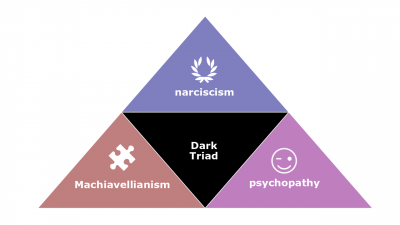Difference between revisions of "Dark Triad"
(→Related coursework) |
|||
| Line 10: | Line 10: | ||
*[[Machiavellianism]]. The degree to which an individual is pragmatic, maintains emotional distance, and believes that ends can justify means. | *[[Machiavellianism]]. The degree to which an individual is pragmatic, maintains emotional distance, and believes that ends can justify means. | ||
| − | ==Related | + | ==Related lectures== |
*[[Human Perceptions Quarter]]. | *[[Human Perceptions Quarter]]. | ||
[[Category: Septem Artes Administrativi]][[Category: Articles]] | [[Category: Septem Artes Administrativi]][[Category: Articles]] | ||
Latest revision as of 13:18, 4 January 2019
Dark Triad (hereinafter, the Triad) is a constellation of negative personality traits consisting of Machiavellianism, narcissism, and psychopathy.
Definitions
According to Organizational Behavior by Robbins and Judge (17th edition),
- Dark Triad. A constellation of negative personality traits consisting of Machiavellianism, narcissism, and psychopathy.
Components
- Narcissism. The tendency to be arrogant, have a grandiose sense of self-importance, require excessive admiration, and have a sense of entitlement.
- Psychopathy. The tendency for a lack of concern for others and lack of guilt or remorse when actions cause harm.
- Machiavellianism. The degree to which an individual is pragmatic, maintains emotional distance, and believes that ends can justify means.
